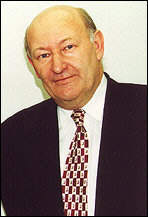 Telecoms Telecoms |

As elsewhere in Europe, the Czech Republic had a monopolistic national telecommunications operator, Cesky Telecom. In line with the requirements of the European Union, the Czech Republic had to agree to demonopolisation of the telecoms market and fully open the Czech telecommunication market on January 1, 2001. Unfortunately, recent legislation postponed real liberalization (including number portability and operator choice) until 2003. It is undoubtedly a great news for Cesky Telecom and the government that will be selling its majority stake in the upcoming months and hopes to get more for an operator that will have more time to prepare for competition, especially in the residential voice telephony market. As the situation stands now, all data telecommunications services are fully liberalized (including internet service providing and IP telephony). All telecom operators will be able to offer their voice telephony services to both corporate and individual users as of January 1, 2001. However, the choice will be limited as users will not be able to take their old phone number when they switch operators and they will also have to use the same operator for all calls (local, inter-city, international) as call-by-call choice of operators will also not be introduced yet.

This will undoubtedly rise the price the Czech government will get for its stake in Cesky Telecom but may slow down the flow of investment into fixed telephony services. Mobile operators, on the other hand, will undoubtedly benefit since the continued perception of monopoly will allow them to present their services as the only clear alternative. Depending on how they position themselves, the continuing monopoly towards end users may in the end help the contenders once the telecom market liberalization is finished. One of the strong players will be Ceske Radiokomunikace (CRa), originally the state-designed carrier of radio and TV signal. The company has expanded in mid-90's into a multiservice telecommunications company, adding data transmission services for corporate customers, as well as voice transmission (for other telecom operators only, i.e. becoming the carrier for carriers). Later, CRa become the 51% partner in the second mobile operator in the country, RadioMobil (Cesky Telecom holds the same stake in the first mobile operator, EuroTel) and last year founded Contactel, a 50:50 joint venture with TeleDanmark. "Contactel will be offering public voice telephone services and compete on the liberalized market," explains Miroslav Curin, managing director of CRa. Contactel will also be the prime source of CRa's expansion, as its other large daughter company, RadioMobil, will be taken over by C-Mobil consortium (led by Deutsche Telekom), currently the 49% shareholder of RadioMobil. "Support of Contactel indeed is our main concern, especially in its targeting end users of either internet or voice services," says Curin, adding that his company does not want to leave the field of mobile phones entirely even though CRa has only 39% of RadioMobil left.
However, his plans may be altered by the entrance of a new owner that the state should select by the end of the year or early in the year 2001. While originally TeleDanmark, currently the second largest shareholder in CRa, should have directly acquired 13% of CRa (so that it would hold over 33%) and the rest of the state's shares should have been sold on the public market, the government has decided to change the plan and sell its whole stake to a single strategic investor. TeleDanmark is still interested in bidding for CRa but it will have a strong competitor in Deutsche Telekom that has repeatedly confirmed its interest in CRa.
| The boom in telecoms the Czech Republic has experienced in the last few years has been a blessing for companies building telecommunications infrastructure. One of the best example would be Sitel, focusing on laying of metallic and optical cables, building telecom transmission systems, installing telecom exchanges, cable TV, mobile and satellite technology. "Sitel was established in 1991 and over the nine years has grown from 15 people to about 400 employees and increased its presence into Slovakia, Ukraine and Russia," says Jan Novak, managing director and 50% owner of Sitel. But as Cesky Telecom finishes modernization of its network, companies like Sitel will have to look for new opportunities (Czech and Slovak national carriers for example used about 60% of Sitel's capacity). Novak believes that his company will be one of the World Investment News Ltdrs among the 600 or so telecom companies providing telecom construction and installation services in the Czech Republic. Why? "Only a few of these 600 have a wide range of complementary services. We do - and moreover, we provide further services to our customers, including maintenance and guarantees, focusing on long-term cooperation," Novak explains. Besides that, Sitel established a joint venture in the United States and is looking into opportunities in the Eastern Europe, especially Russia and Ukraine.
If they will be able to keep its plans, companies like Sitel will form a strong base for the future growth of the Czech telecoms sector and the whole economy in general. One of the strong players that focuses on international expansion from its very start is Strom Telecom, company with two strong projects - Telesis, a customer care system for telephone operators, and digital switching system. "The digital switcher we have developed has practically unlimited capacity and hundreds thousands ports, offering the telecommunication companies to prepare for the upcoming explosive growth of demand, both in the terms of number of connections and their speed," says Nihad Hurem, managing director and one of the cofounders of Strom Telecom. Moreover, he stresses one important advantage his company and others in the Czech Republic have: people. "Czech people are very good in technology, engineering, mechanics and testing," he explains, adding that it is also very easy for a Czech-based company to attract highly skilled technical people from the former Soviet Union, thus improving the technical potential of his company. And undoubtedly, the potential of Russian technical experts is enormous. "While for example in Germany they use their technical experts 100%, Russian experts are used by only maybe 1%," says Hurem, pointing out the strength hidden in attracting Eastern European brains and joining them with western-level business experience.
Besides telecommunication companies, energy companies are entering the game as well. For example Mero, the operator of two international oil pipelines, owns an optical cable along both pipelines, renting it out to telecoms and internet service providers. The strongest player among the national energy companies is CEZ, the state-owned energy producer, that owns nationwide network of optical cables and has established a daughter company to operate it.

Telecoms in general are currently an enormous investment opportunity in the Czech Republic. Besides immensely fast growing number of mobile users (mobile penetration as of May 2000 was over 25% of population) and fixed phone operators gearing up to challenge the monopoly operator Cesky Telecom, there are ample opportunities in both telecom infrastructure (including new technologies) and internet. Unlike the fast growing number of mobile phone users, internet has been much slower to spread and the current penetration is only about 5-6%. However, judging from the experience of other European countries, this is exactly the level of penetration when the growth rate speeds up and companies come with new internet-related services and large portals. The Czech Republic has recently seen a large wave of venture-capital investment into internet service providers and the largest general search engines/portals and many new projects are currently under way. |

